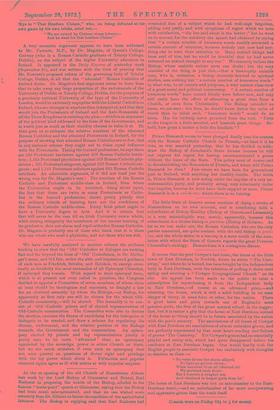We have carefully analysed in another column the evidence 'tending
to show that the 'Old' Catholics at Cologne are rushing fast and far beyond the lines of 'Old' Catholicism, in Dr. Dollin- gees sense, and bid fair, under the able and impassioned guidance of such men as Friedrich, Schulte, and Reinken, to emerge even- tually as decidedly the most rationalist of all Episcopal Churches, if episcopal they remain. With regard to their episcopal form, which is at present not even called in question, the Congress decided to appoint a Committee of seven members, of whom three at least should be theologians and canonists, to draught a law for an electoral assembly by whom the Bishops,—or Bishop, for apparently at first only one will be chosen for the whole Old- Catholic community,—will be elected. The Assembly is to con- sist of Old '-Catholic priests and of elected representatives of Old-Catholic communities. The Committee were also to discuss the election, examine the fitness of candidates for the bishoprics or bishopric to be created, and draw a scheme for regulating the diocese, endowment, and the relative position of the Bishops towards the Government and the communities. An episco- pacy elected by priests and lay representatives jointly is pretty sure to be more 'advanced' than an episcopacy appointed by the sovereign power in either Church or State, but we are much mistaken if even such an episcopacy does not soon quarrel on questions of divine right and privilege with the lay power which elects it. Plebiscites and popular electoral rights agree as ill with mitres WI with imperial sceptres.


































 Previous page
Previous page